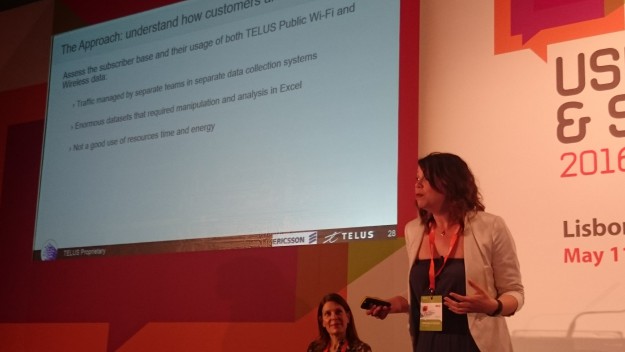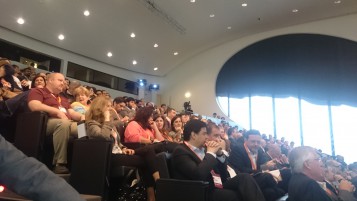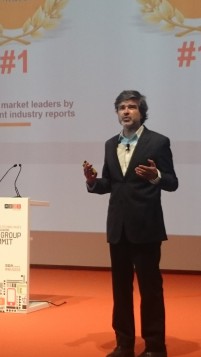For years I’ve been hearing about the annual WeDo Technologies User Group Summit (#WUGS16) in Portugal, says Jeremy Cowan. This year I kept the diary clear for long enough to accept their invitation and leg it to Lisbon.
Wednesday
I know I’ve said it before but I have the utmost respect for organisations prepared to throw their doors open and put so many of their clients in one room. I have justifiable faith in our team at VanillaPlus Towers who have not only grown our brand consistently since 1999 (as rivals come and go) and have gone on to do the same for IoT Now and IoT Global Network, but I know I would swallow hard before emulating WeDo. So, respect to Rui, Sergio and all.
Some highlights of #WUGS16 then. Vodafone UK’s new-ish head of A&R, Mark Lloyd is candid about the speed of deployment for the RAID Partner Incentives Assurance module, designed to improve the speed and accuracy of commissions paid to Vodafone’s external partners. How fast is the deployment? It began in April and will complete in June 2016 – which is exactly half the time it took Vodafone UK to finish the Purchase Order process. “I come from RA (Revenue Assurance) and I’ve never seen such a quick delivery timeline,” says Lloyd.
So how are things with your external partners?
“We have good relations, but there have been no regular reports,” Lloyd concedes. “We want to have weekly reports – we’ll probably never get to zero queries but partners can gain confidence that we’re running it well.”

Another operator that has needed better reporting is Telus Canada. They have been working with Ericsson and WeDo to deploy the RAID Revenue Assurance program. Reporting has now been delivered for wireless data, notifications, Koodoo usage and data roaming, and further elements are in the pipeline. One of Telus management’s most urgent needs was to know whether its Free Public WiFi offering was cannibalising cellular data revenues, in fact the Board had been asking for reports on this for two years. Well, now they have it. WeDo built them eight dashboards which showed in the first analysis that WiFi represents an average of just 1.16% of Telus subscribers’ data usage.
Catherine Blair, Telus Canada’s director of Products & Services, says she and her team wanted to know what else is happening to subscribers, to understand trends and groups. RAID shows that 4.4 million subscribers never used WiFi in Q1 2016, while 1.5 million access WiFi for 1-20% of their usage. “We can export a small dataset to examine actual ARPU (average revenue per user) impact in large usage bands. Maybe now I will look at smaller bands, the 1-10% and 80-90%. RAID came in as a revenue management tool but became our business insights tool.”
Ericsson Canada’s managing director, Ora Shalom-Berger adds, “RAID opens executives’ appetite to ask more questions about the business, to improve customer experience, and cut costs.”

Thursday
The CEO of SonaeIM (WeDo’s parent group — IM is for Investment Management), Claudia Azevedo quoted some interesting analysis in her opening remarks. I’ve seen some of it before on Twitter but for those that haven’t it bears repeating as it underlines the pace of change in tech investment. Of all the Fortune 500 companies listed in 1955 89% are no longer listed, she says.
She continues that, “the average lifespan of a Standard & Poor’s 500 company has fallen from 67 years in the 1920s to 15 years today.” Then she adds plausibly but more speculatively, that in the next 10 years 40% of all S&P 500 companies will disappear from the list.

All of which makes CEO, Rui Paiva’s litany of WeDo milestones since launch in 2001 seem more significant. He talks of 170 customers in 98 countries and a record positive EBITDA (earnings before interest, tax, depreciation & amortisation) in 2015 of €74 million.
The acid test will be whether his 3-point philosophy will ensure his company is one of the few that survives and prospers. He says their products will always be highly integrated, with agile development – using roadmaps, modularity, etc. – and offering the best three-year TCO (total cost of ownership) in the market.
Asked whether the skills are out there, particularly among data scientists, to achieve his growth plans, Paiva is adamant that they are. “Yes, we have them but we’re looking for people from technical universities, and we’ll train them ourselves. We expect to open an office in India soon and they have the skills.”
The author of this column is Jeremy Cowan, editorial director of VanillaPlus.
Comment on this article below or via Twitter: @ VanillaPlusMag OR @jcvplus






